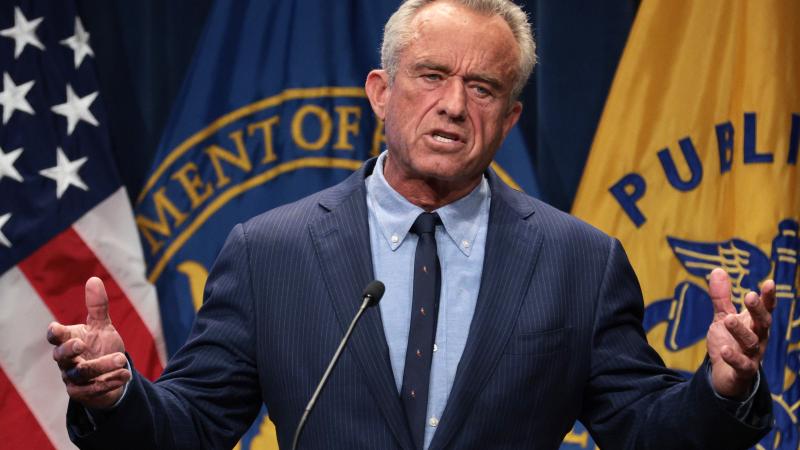Conservative Climate Caucus hopes Trump team keeps US energy policy clean, but bit more burning red
"With President Trump at the helm, and America leading the way, a future full of sustainable, clean energy is certain,” Rep. Buddy Carter, vice chair of the Conservative Climate Caucus, said.
Democrats and the Kamala Harris presidential campaign had hoped to attract more voters with accusations that Republican candidate Donald Trump was a “climate denier” and claims that his administration would spell the end of any hope of addressing climate change.
“Former President Donald Trump, who has famously called climate change a 'hoax' for many years, hasn’t used the word lately with respect to climate change. But he still clings to some similar arguments,” the liberal opinion site FactCheck.org wrote in September before Trump and the Republicans sailed to victory in the White House, Senate and House of Representatives.
Climate cabinets
While Trump has stated climate change is a hoax, his nomination of North Dakota Gov. Doug Burgum for Interior secretary and Liberty Energy CEO Chris Wright – both of whom affirm that climate change is real – suggest that policies seeking to abate greenhouse gas emissions won’t be off the table in the second Trump administration.
Rep. Buddy Carter, R-Ga., vice chair of the Conservative Climate Caucus, told Just the News that Trump’s victory is a win for their goals.
“America has some of the cleanest energy on the planet, and under President Trump, we will be able to produce more of it and share it with the world," he said. "Energy demands are increasing significantly and will require an all-of-the-above portfolio. President Trump plans to unleash our energy potential, and that includes clean energy. With President Trump at the helm, and America leading the way, a future full of sustainable, clean energy is certain."
Caucus members believe that climate is changing and private-sector innovation is key to lowering emissions while maintaining energy affordability.
While Burgum governed a state that is the third-largest producer of oil in the United States, many of his ideas align with those of the caucus. In 2021, he announced a plan to make North Dakota carbon neutral within roughly the next six years, and he’s been a champion of carbon capture.
“We can reach carbon neutrality in the state of North Dakota by 2030 without a single mandate, without any additional regulation. We can get there just through the innovation and the different geology that we have,” Burgum said at an event with the Energy Secretary Jennifer Granholm.
Like Trump, Wright has been labeled a “climate denier,” but Wright openly states that climate change is real. The label appears to come from the fact that he doesn’t demonize fossil fuels.
“Climate change is a real and global challenge that we should and can address. However, representing it as the most urgent threat to humanity today displaces concerns about more pressing threats of malnutrition, access to clean water, air pollution, endemic diseases, and human rights, among others,” Wright wrote in Liberty Energy’s ESG report, “Bettering Human Lives.”
Manufacturing and permitting
With these figures heading two departments that will influence energy policy in the second Trump administration, it’s not hard to see why climate conservatives see Trump’s victory as an opportunity.
Luke Bolar, chief external affairs officer for ClearPath, praised Trump’s cabinet nominations and said the group is excited for the opportunities in the next four years.
ClearPath advocates for innovations in nuclear energy, carbon capture, hydropower, natural gas, geothermal, energy storage, and clean manufacturing as a means to address climate change.
Wright is a vocal proponent of nuclear energy, which Bolar said was one of ClearPath’s biggest portfolio areas, and they anticipate that the administration will help onshore more manufacturing.
“Our manufacturing processes are cleaner than most of the rest of the world, and there's a lot of innovations in how you can get process heat, and how you can manufacture these products in a lower emission way that we see as big economic drivers and sort of onshoring the manufacturing process too. And so I think the manufacturing sector actually dovetails really closely with the energy sector right now and the broader innovation goals and lower emission goals,” Bolar told Just the News.
He said, with Burgum’s understanding of carbon capture management solutions and carbon capture technology, he’ll be “well equipped to bring some of those learnings to the federal level.” Burgum, Bolar added, will also be supportive of permitting reform, which is important to the “all of the above” strategy that a right-of-center policy strategy seeks.
The American Conservation Coalition, a nonprofit organization that aims to bridge the gap between conservative values and effective environmental action, also sees a lot of potential for advancing its goals in the new administration.
“We're certainly optimistic about what a second Trump administration could mean for both energy dominance, but also addressing our environmental challenges,” Karly Matthews, vice president of communications for the ACC, told Just the News.
The ACC is also hoping some form of permitting reform will be successful in the coming year.
“Any sort of energy comes with trade offs, and we need to be okay with some level of trade off when it comes to unleashing American energy, and specifically clean American energy…. There has been some bipartisan agreement on the need for permitting reform, and now it's just really a matter of ironing out those details and ensuring that both sides are comfortable with the deal that they reach. But I think regardless of where you are on the political spectrum, we have to acknowledge that energy permitting reform is not optional. We have to unleash American energy,” Matthews said.
Burdensome regulations
Carter, the representative from Georgia, said that voters responded well to the conservative perspective on climate change, because addressing the problem requires the U.S. to be an energy leader.
“For example, we produce the cleanest natural gas on the planet, but with burdensome regulations imposed by the Biden-Harris administration, it has become harder and harder to obtain,” Carter explained.
While polls consistently show that voters are concerned about climate change, they rate other issues, such as the economy, much higher. Carter said that the climate conservative position, which acknowledges the need for affordable energy, was far less likely to turn voters away, many of whom were concerned about the economic consequences of the Biden-Harris administration.
“Americans know that by producing more, we can keep costs down and fuel economic growth that benefits all Americans. Americans see that we are a leader in emission reductions while growing our economy,” Carter said.
While the Biden-Harris administration had pursued expansive regulation as the means to fight climate change – including EV mandates, appliance efficiency standards, and pressure on the oil and gas industry – voters ultimately chose a president and party that advocates for government to take less of a role in the problem.
“Regardless of what energy you want to produce, burdensome regulations are holding us back. That, in turn, drives up costs. We can, and should, do both. We can prioritize an all-of-the-above,’ reliable energy solution, and keep costs low for Americans. Pro-growth and pro-environment are not mutually exclusive,” Carter said.
The Facts Inside Our Reporter's Notebook
Links
- liberal opinion site FactCheck.org wrote
- Conservative Climate Caucus
- align with the CCC
- champion of carbon capture
- Burgum said at an event
- climate denier
- Bettering Human Lives
- ClearPath
- process heat
- American Conservation Coalition
- rate other issues
- EV mandates
- appliance efficiency standards
- pressure on the oil and gas industry














